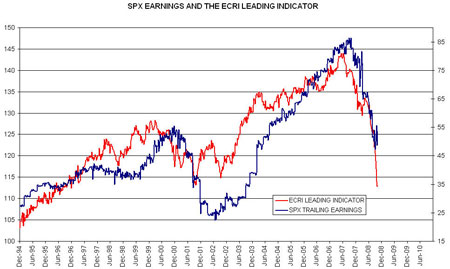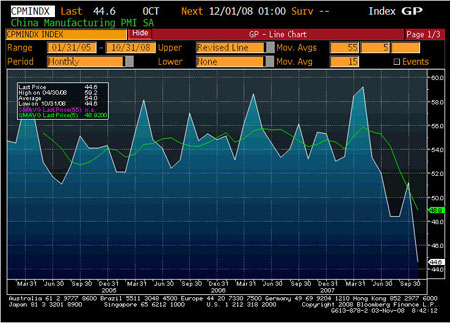So……while markets expected Friday’s fixing/rebalancing to be the tempest of a lifetime, at the end of the day it was much ado about nothing. Still, it brought closure to a month that was bloodier than Macbeth for many punters, and ultimately may consign more than a few to a grisly fate a la Romeo and Juliet.
In any event, everyone’s MTD column has rolled back to zero, and markets are now entering the stretch run into the end of the year. The backdrop remains one of turmoil, and the midsummer night’s dream of a resolution to the crisis has been rolled forward into a bull’s winter’s tale of how the SPX (and other markets) now offer attractive value. Colour Macro Man skeptical; the arguments in favour of attractive equity valuation are not as black and white as the pieces on an Othello board. Indeed, comparing the current market measure for measure with the past does not offer a lot of encouragement.
The ECRI US leading indicator has crashed back below the lows seen during the last recession; an equivalent out-turn for SPX earnings would taken them down 60% from current levels (and 75% from the consensus expectation for 2009.) So while Macro Man can see the argument for renting an equity long as a trade, he’s not sure if he’d want to hold it past the twelfth night.
This week also sees the latest episode in the comedy of errors that has been economic policymaking in Europe. The ECB will almost certainly cut rates, probably by half a percent; unfortunately for M. Trichet and co., it probably comes too late for the merchant of Venice or two gentlemen of Verona.
Similarly, the Bank of England will cut rates, with expectations ranging from 50 bps to a full percent. Macro Man had a chat with his mortgage broker over the weekend, as his current deal expires early next year. The deals on offer made grim reading; despite having very little leverage in his mortgage, Macro Man is looking at an effective rise in his borrowing rate of 1.5% over his current deal. Borrowers with less equity and a greater loan-to-income ratio are no doubt getting squeezed even harder. So while the merry wives of Windsor (the Queen, Camilla, et al.) may not be in any trouble, your average UK mortgage holder (as well as Europeans like Timon of Athens) is facing a very significant squeeze.
And something still appears to be rotten in Denmark; witness Danske Bank’s special access to the Fed’s liquidity milk-teat, announced last week. Someone needs to get Hamlet on the phone and figure out what the hell is going on there. EUR/DKK has fallen back towards the bottom of its range, which to Macro Man looks like a cheap way of playing a relapse into crisis.
Because from his perch, the situation with the global economy just looks worse and worse. Over the weekend China’s PMI sank to a level well below 50, indicating a manufacturing recession. There isn’t much history to the survey, so at this juncture it’s difficult to judge how significant the reading is. Still, the fact that the authorities have relaxed restrictions on bank lending, essentially telling them to “lend as you like it,” is telling. How effective this is remains to be seen.
And of course, Tuesday sees the US elections, where we’ll finally know the identity of the replacement to the current US administration, whose terminus is as widely anticipated as the government of Julius Caesar. There appears to be some sort of belief, particularly on this side of the Atlantic, that the election of St. Barack will effect some sort of immediate improvement in the state of the US economy and the market.
Such a belief is probably misplaced; even if the calibre of leader goes from King Lear to Henry V (and that remains to be seen), it will be a long, hard slog out of the current mess. Looking at prior revolutionary leaders of the past from both sides of the political spectrum (FDR, Reagan/Thatcher), there have been several years of pain and generally poor market performance before things meaningfully and lastingly improve. (Of course, this assumes that McCain and Palin are dispatched like Antony and Cleopatra, but at this juncture that seems like a safe bet.)
Of more immediate interest is the summit in mid-November, where the G7 will discuss changes to the global financial architecture. France has been particularly vocal in agitating for change, with both President Sarkozy and Finance Minister Christine Lagarde regularly appearing on the wires in recent months. For those countries who seek an evolution, rather than a revolution, of the world’s financial system, the taming of the shrew (and her boss) will be an imperative for the summit.
Ultimately, the decisions taken at this summit could be crucial in determining the future of the global financial system and, by extension, the world economy. Dirigiste or market-based? Inclusive (giving China, the GCC, et al a seat at the table in exchange for an end to piss-taking) or exclusive? These issues are pretty critical to the future of those of us in global finance, and it wouldn’t surprise if the negotiations are as bloody as Titus Andronicus.
When the history of our times is written, these decisions may well determine whether the next decade or two end in comedy….or tragedy.
- Bulenox: Get 45% to 91% OFF ... Use Discount Code: UNO
- Risk Our Money Not Yours | Get 50% to 90% OFF ... Use Discount Code: MMBVBKSM
Disclaimer: This page contains affiliate links. If you choose to make a purchase after clicking a link, we may receive a commission at no additional cost to you. Thank you for your support!




Leave a Reply